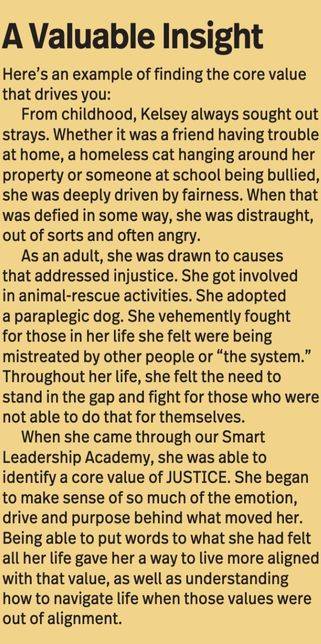What comes to your mind when someone asks you: What are your values? In my experience, most people stare blankly or come up with the same answers. (The top three are integrity, communication and honesty.) Or, if they’ve thought about it at all, they respond with what they believe in (a world view, but not necessarily a value), what they aspire to (I’d like to be …) or what they think they should value (everyone should value integrity, humility, fairness, etc.).

But within each of us sits a set of values we already live by, whether we realize it or not. When we identify and define our deep values — the ones we already own — they become guideposts for our decisions, our compass for how we lead and influence and how we create alignment in our lives.
Values are conceptual, often intangible and instinctive. They can be hard to put into words; they just “are” and we feel them in our gut. Most people aren’t aware of them, but certainly feel the emotions that are triggered when they are challenged or threatened. We understand their influence by the inner joy we have when we live in alignment with them or the dissonance we experience when we are living out of alignment or when people violate our values.
Everything in our lives is driven by our values. Every decision, every conversation and every interaction is affected by our values. When we know what those values are, and we experience frustration, irritability, being ill at ease or just plain miserable for no good reason, we can turn back to our values and say, “Ahh, that’s what it was.” Our values always alert us to areas of misalignment, and in that split second we can choose how we will get back into alignment with ourselves.
As leaders, wouldn’t it be important to know this? How might our relationships with our teams be different if we were fully aligned with our values? How would our decisions, attitudes, moods and responses change? How much less stress would we experience? How many fewer reactive moments would we have, fewer apologies to make, fewer moments to regret?
Not All Values Are Equal
It’s necessary to distinguish deep core values from “what you value.” For example, most everyone would value health, but not everyone lives in a way that prioritizes health as a core value. If health is a deep value, it drives your behaviour and is a consistent guiding principle for making decisions. It shows up regularly in your actions.
Physical objects like money are not values in themselves. Rather, they point to an underlying deep value such as security, freedom or generosity. Character qualities must also distinguished from deep values. Few people would suggest that honesty is not an important character trait, yet honesty may not be a core value.
Clues to what your values actually are:
- Emotions: Pay attention to what makes you FEEL something deeply. Emotions are a strong indicator of your core values. Take note of things that make you feel something deeply. What movies, books, podcasts or life events move you deeply? There’s a value hidden there.
- Curiosity: What can you never learn about enough? What, more often than other things, occupies your thoughts?
- Time and money: When you have extra time, what are you always drawn to do? When you have extra money, how do you want to spend it?
- Inspiration: What consistently inspires you? What makes you feel awe and wonder? What are you doing when all else falls away — when time disappears and you’re immersed?
How to define your values:
- Do a Google search for a list of values words. Circle ALL the words that resonate with you or that you feel are somehow important to you. Don’t think — just react.
- Put the words you’ve chosen into “clusters” that are similar. For instance, achievement, success, hard work and productivity could be a cluster.
- For each cluster, see if one word encompasses all the others as the defining value. In the example above, to be successful you need to achieve goals, work hard and be productive, so the value could be success.
- Once you’ve pared it down to 10 to 15 clusters, do the same with those words until you are left with no more than five to seven values.
- Once you have your final list, spend time defining what those values mean to you. The word itself is not enough. For example, to one person “freedom” can mean “no limits” and to another, “limits that create choices.” Ask yourself why that value is important to you and how it feels when you are misaligned — this will give you clues for your definition.
Be patient and give yourself time and space to really dive in. This is deep work and it’s tempting to settle on the surface stuff, but allow yourself to dig deeper until you feel in your gut: “This is it!” This is some of the most important work leaders can do to increase their effectiveness and impact. Of the more than 70 alumni of our Smart Leadership Academy, 90 per cent have cited the values work as being one of the most impactful and life-changing things they did in their six-month journey.
That is significant evidence of the importance of this deep work. As leaders, knowing and being aligned with our values changes everything. In our hustle-and-bustle, fast-paced, rapidly changing world it’s rare for us to take the time for deep reflection. Doing so takes us to a different level and heightens our capacity to be and do better with the people we lead.
So, what do YOU value? Answering this question will change your life.
Ingrid Vaughan, principal of My Smart HR and founder of the Smart Leadership Academy, provides HR support and leadership coaching to small-business owners and managers.
Image: Getty Images.
























